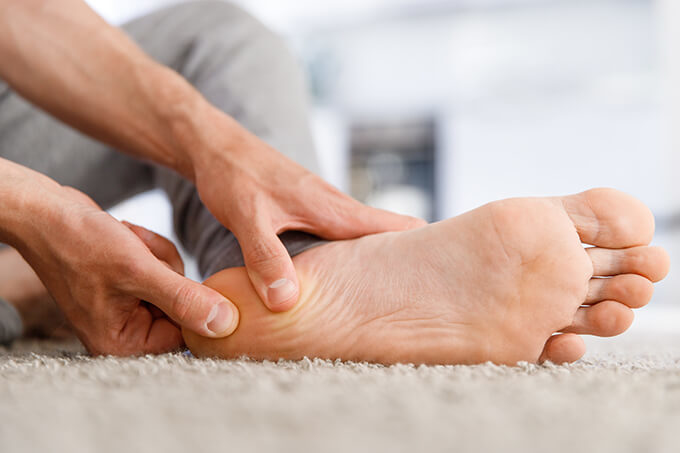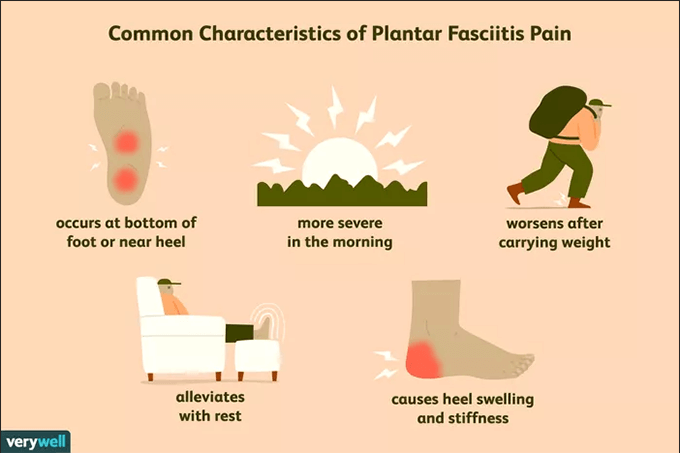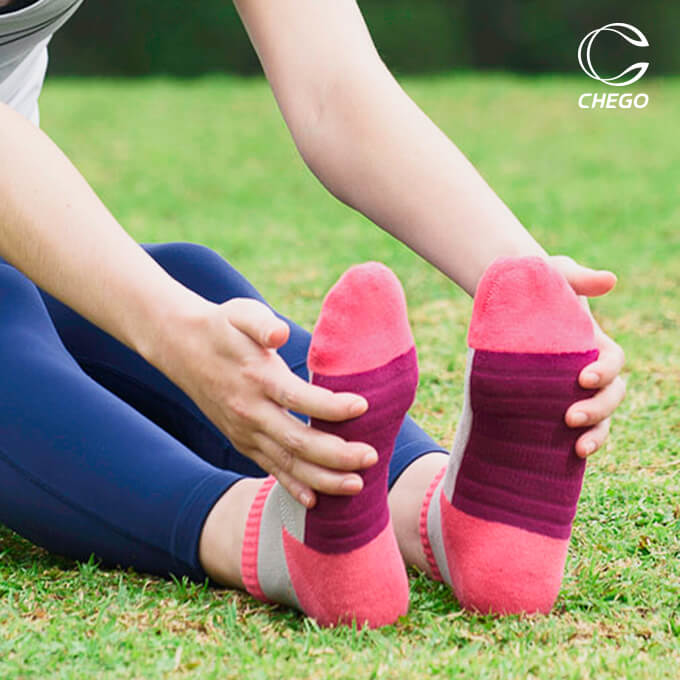What Is Plantar Fasciitis?
Plantar Fasciitis is a common cause of heel pain.
The feet’ soles bear all the body weight, and the "plantar fascia" is like the cushion of the sole.
It can absorb the impact force generated by the ground when walking, jumping, or running.
It also maintains the stability of the arch of the foot.
If the plantar fascia bears too much impact, some tiny lacerations will occur. These minor lacerations will heal on their own at the beginning,
but if you over-stimulate the feet’ soles for a long time, over the years,
it will become inflamed and swollen, and "plantar fasciitis" will form one step closer.

The 5 Risk factors
Even though plantar fasciitis can develop without an apparent cause, some factors can increase your risk of developing this condition.
They include:
1- Age
Plantar fasciitis is most common after the ages of 40.
As you get older, your foot muscles, ligaments, and tendons are gradually degraded.
The atrophy of the plantar fat pad reduces the cushioning effect,
which increases the load on the plantar fascia. So plantar fasciitis often occurs after 40 years old.
2- Uncomfortable Shoes
Shoes can help disperse the impact of the feet.
However, if you wear shoes that are not ergonomic for a long time, such as high heels or sole solid materials,
it will invisibly increase the pressure on the arch. It will also cause Plantar Fasciitis.
3- Overexercise
Overexercise will cause the plantar muscles and tendons to be overwhelmed.
Excessive use of the plantar fascia can also cause plantar fasciitis.
Do exercise is good for health, but it should be in moderation.
4- Foot Mechanics
Flat feet, high feet arch, or an abnormal walking pattern will affect the weight distribution when you're standing or walking and add stress on the plantar fascia.
5- Excessive Weight Bearing On The Feet
People who have to carry heavy objects for a long time have a higher risk of getting plantar fasciitis.
Such as movers or construction site workers.
Also, overweight people are high-risk groups! Because the feet bear long-term high weight and insufficient exercise,
the plantar muscle strength is weak, which increases the burden on the foot and causes plantar fasciitis.

(Image: www.verywellhealth.com)
How to Prevent Plantar Fasciitis?
The key to preventing plantar fasciitis lies in the two points:
- Reducing the burden on the feet.
- Relieving the plantar fascia.
Follow the 5 points to prevent plantar fasciitis properly:
1. Choose the right shoes and insoles.
2. For those with congenital foot structure abnormalities, consult a doctor about wearing suitable shoes.
3. Avoid overexercise and warm-up before work-out.
4. Do what you can when you lift heavy objects.
5. Weight control.
Choose the Right Socks, Say Good-Bye to Plantar Fasciitis!
In addition to shoes and insoles, choosing suitable socks is also an important part! We recommend the CHEGO Cushion Ankle Socks for the people who have Plantar Fasciitis or high feet arch:
- Full-foot Cushion: Minimize feet friction
- Right-Angle Heel: Full fit and stability
- Breathable Mesh: Keep feet cool and dry
- Antibacterial Fiber: Stay away from foot odor
- No Stitches: Ensure optimal comfort
The CHEGO Cushion Ankle Socks are breathable and cozy.
The most important thing is the "Full Cushioned Design" on the soles of the socks.
It can effectively buffer the sole’s reaction force when stepping on the ground and protect the plantar muscles all around.
We highly recommend it to people who are troubled by plantar fasciitis.
It is also suitable for people with high arch feet! The impact of the high arch is much higher than the standard feet arch.
Whether the shoes, insoles, and socks, we recommend choosing the footwear with a "cushioning function" to protect the feet fully.
Shop CHEGO Cushion Ankle Socks:

Suppose you already have plantar fasciitis, in addition to the usual stretching and massage.
In that case, You must find a professional doctor for consultation, and a complete course of treatment can reduce the chance of recurrence!
—
You may be interested:
// Are Compression Socks Good for Sports? //
// How to Choose the Best Running Socks? - About Foot Arch //









